Quang Tri province is located in the Central Vietnam - the land of sun and wind, the intersection of the North - South axis (National Route 1A Ho Chi Minh Highway, North - South Railway) to the axis of the East - West corridor via Highway 9 and Lao Bao international border gate. Advantages of geographic and economic position determine role and important position of Quang Tri tourism in the tourism development strategy in Central region. Quang Tri is a province in North Central Coast Vietnam. This province has the demilitarized zone latitude 17, the demarcation line separating two regions of South and North Vietnam, so it was a most fierce battle during the 20 years of the Vietnam War (1954-1975).
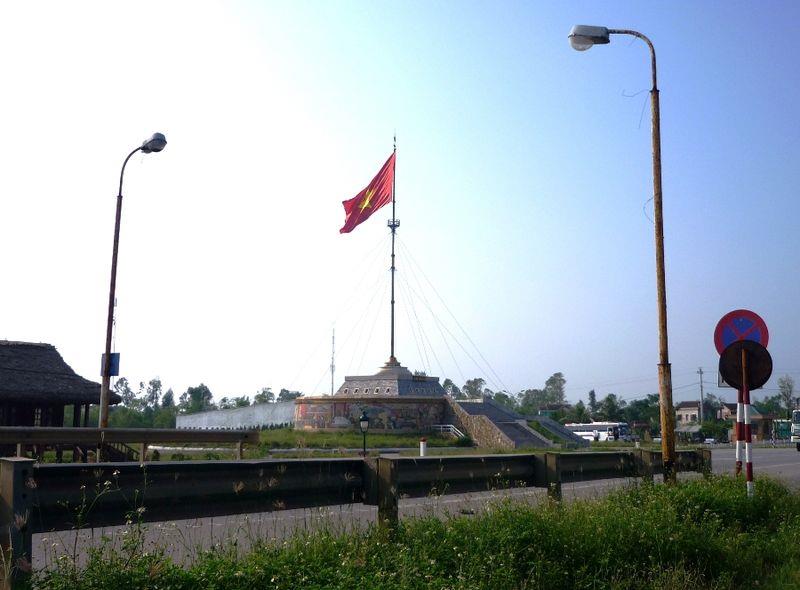
Quang Tri situates between 16°18' to 17°10' north latitude and 106°32' to 107°34' east longitude. The province is adjacent to Quang Binh in the north, Thua Thien - Hue in the south, Savannakhet and Saravane provinces of People's Democratic Republic of Laos in the west and the South China Sea in the east. The central administration of the province is Dong Ha City, located about 598km far from Hanoi city to the south and 1112km away from Ho Chi Minh City to the north. Quang Tri has the advantage of geography - economy, is an important traffic hub, starting point of the life-line route of the East - West corridor connecting Quang Tri with Laos – Thailand – Myanmar via the Lao Bao international border gate to Central ports as Cua Viet, Chan May, Da Nang, Vung Ang... These are the favorable conditions for the economic cooperation in the region, international transport, commercial developing, service and tourism.
Due to the structure of the Truong Son Mountain Range, Quang Tri terrain descends from west to east, southeast and divided into 4 types: high mountains in wester from the Annamite Mountains to hills, midlands and narrow plains along the province, the sand dunes and coastal region. Because the terrain in the west is high and narrow, so the river systems are short and steep. Quang Tri is located in the tropical monsoon climate with the high temperature, the transition zone between 2 two climates. However, Quang Tri climate is considered as a province with harsh climate, affected by dry and hot Southwest monsoon that blows from March to September and often causes drought. From October to February of next year, the climate is affected by northeast monsoon accompanied by rains, so it easily causes floods. Quang Tri has the river system is rather dense; the average density is 0.8 - 1km/km2. Due to the narrow terrain in width, with high Truong Son mountain range, Quang Tri rivers are short and steep. There are 12 large and small rivers in the province forming 3 major river systems including Ben Hai River, Thach Han River and O Lau (My Chanh) River.
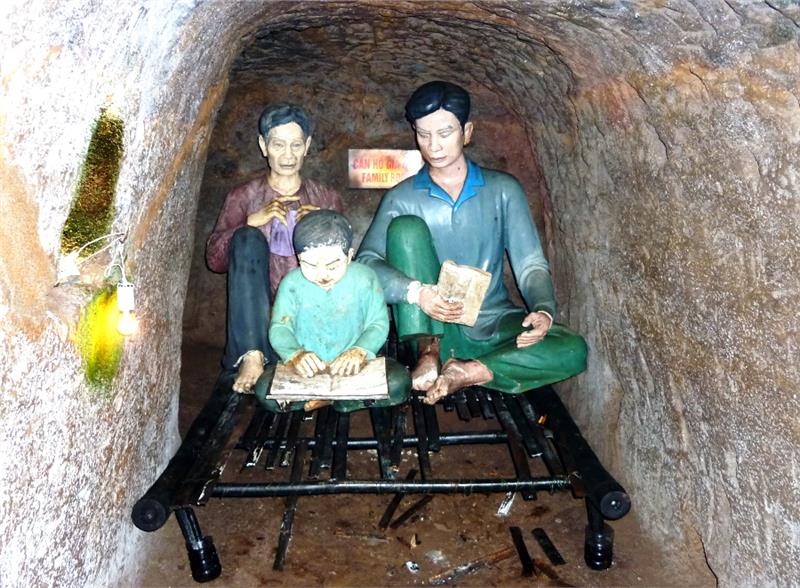
From the reign of Hung Vuong - An Duong Vuong, Quang Tri today belonged to the territory of Viet Thuong tribe of Van Lang - Au Lac. Earlier Han Dynasty (from179 to 192 BC), Quang Tri belonged to Nhat Nam district. A rebellion by the Cham in the 2nd century CE overthrew Chinese control and reestablished local government. Beginning in the 14th and 15th centuries, the Chams were defeated in the area by Vietnamese armies, and ethnic Vietnamese gradually displaced or absorbed those Cham people who had not fled. Over time a distinct Vietnamese dialectical and cultural subgroup developed in the area. The region was seized by the French by 1874. In 1887 it became part of French Indochina. On May 3rd, 1890, Governor-General of French Indochina, Jules Georges Piquet issued the Decree of establishment Binh Tri province from 2 provinces of Quang Tri and Quang Binh.
After Geneva Agreement 1954, Ben Hai River was considered as a temporary military demarcation line, Quang Tri province was temporarily divided into two regions the south of Ben Hai river - Quang Tri province including districts of Hai Lang, Trieu Phong, Cam Lo, Gio Linh, Huong Hoa, Vinh Liem commune and a part of Vinh Son commune (Vinh Linh), and Quang Tri town manged by Republic of Vietnam, and the north of latitude 17 (Ben Hai river) managed by Vietnam Democratic Republic. In July 1989, the 8th of National Assembly Socialist Republic of Vietnam (the 5th session) decided to separate Binh Tri Thien province into 3 provinces: Quang Binh, Quang Tri and Thua Thien - Hue.
In 2010, the average population of Quang Tri was 601.672 people. The province has 136,743 households with an average of 4.4 inhabitants / household. Urban population had 170.073 people, accounting for 28.31%. The rate of natural population growth decreased to 1.05% in 2007 and 1.12% in 2010; mechanical population did not increase significantly. There are 3 major ethnic groups living in Quang Tri consisting of Kinh, Van Kieu and Pa Co. The proportion of ethnic communities accounts for 9% of the total population. Each group has its long history and vibrant cultural traditional, especially folk culture. Ethnic groups of Van Kieu and Pa Ca live mainly in mountainous districts as Huong Hoa and Dakrong.
Quang Tri is divided into 1 city (Dong Ha City), 1 town (Quang Tri) and 8 districts (Cam Lo, Con Co, Dakrong, Gio Linh, Hai Lang, Huong Hoa, Trieu Phong and Vinh Linh). Quang Tri People's Council is directly selected by citizens. This is the agency of state power in the province. People's Committee is the executive body of the People's Council and state administrative agencies in the city, which is responsible for implementation of the Constitution and law, documents of Vietnam Government and conference decisions of the municipal People's Council.
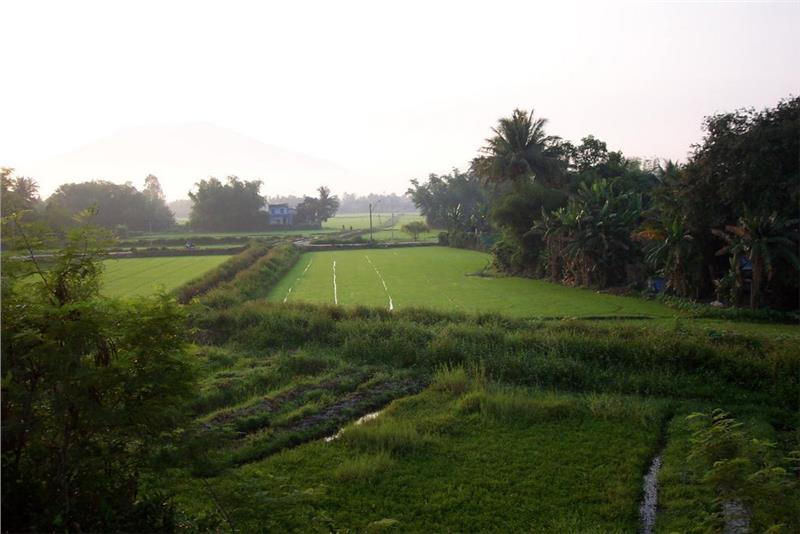
In 2014, the province's socio-economic development plan was implemented in the complicated context of the world economy and the country. However, under the leadership of the Party, Government and effort of the province, Quang Tri economy achieved significant results. Planted area of annual crops reached 82,718.2ha, up 1.5% compared with 2013. Productivity, the output of most crops increased over the same period last year. Total cattle and poultry were stable in quantity and quality. In the year, the climate is favorable for fishing. The building and upgrading of vessels, purchasing fishing equipment for offshore fishing was concerned. The output was estimated at 21,070 tonnes, up 9.3%. Aquatic products exploited mainly fish with high economic and export value such as mackerel, tuna, and squid... The aquaculture area estimated 3,341.3ha, up 1.1% over the last year.
In 2014, the province planted 5500ha forest, reaching the plan. During 2014, the province implemented many policies and priority solutions to remove difficulties for production and business. The commercial banks reduced lending rates, loosened credit conditions, helped businesses to access capital for investment in technological innovation, machinery and equipment in order to increase competitiveness. The industrial production value reached VND 6,056.7 billion, up 9.1% over the last year and 0.9% compared to the plan of 2014. Transportation business activities in the province in 2014 maintained growth as the previous years. Revenue of transportation activity in 2014 reached VND 980.2 billion, an increase of 9% compared to in 2013.
Total retail sales of goods and service was estimated at 19,516 billion dong, up 13.3% compared to 2013. Export and import of goods had significant steps over the previous year. Import turnover reached 190.5 million USD, up 44% over the last year. Import turnover reached 215 million USD, up 41.7% compared to the last year. The province granted investment certificate for 6 projects with total registered capital of VND 197.87 billion in economic zones and industrial parks. Industrial clusters attracted 83 projects with the total registered capital of VND 930,747 billion. The friendly cooperative relations between Quang Tri with international friends in 2014 continued to be strengthened, by maintaining and developing friendly cooperative relations with local authorities on the East-West economic corridor, strengthening ties with South Korea, Japan, the embassies of the countries and other international organizations.
Continue to maintain and consolidate the results of compulsory primary education, literacy and compulsory secondary education in 141 communes, wards and towns. Until now, Quang Tri ranked the 18th among the provinces and cities which meet standard in the compulsory preschool education for 5 year-old children. Health network continued to be enhanced and developed. The province has 1625 hospital beds, up 2.5% over the last year. The medical team has been training to improve the professional quality and management. The national health program is implemented uniformly and reaches fairly good results, many new and modern technologies deployed in health care. Create jobs has positive signs. The solutions in creating employment, vocational training, credit assistance, counseling, employment assistance are implemented uniformly.
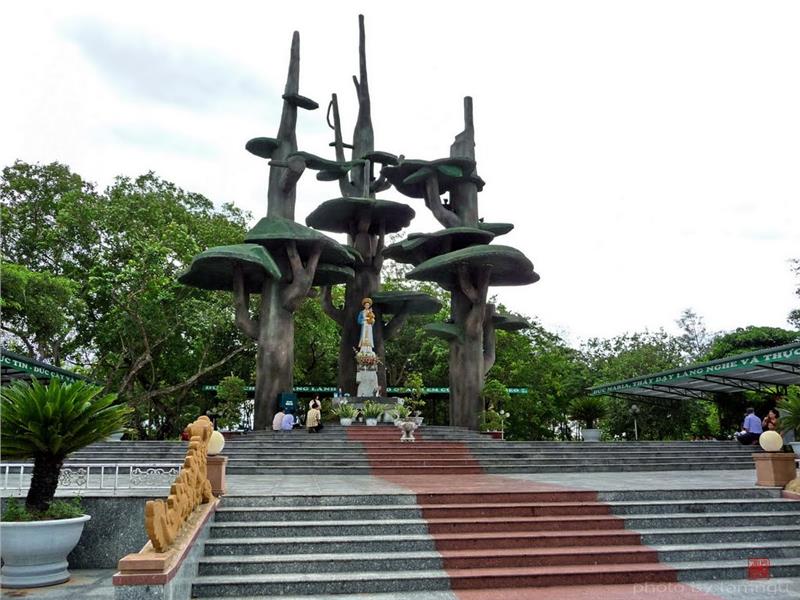
Cultural identity of Quang Tri has a distinct mark, imbued the beauty of land and people in this province. In the tangible and intangible cultural heritage of Quang Tri, the cultural heritages in revolutionary war are enormous and completely worthy to stand in the position of the top landmarks of the country and the world. Quang Tri people has the traditional fondness for learning, hardworking, creativity in production and the mutual love in life, especially in natural disasters and epidemics, in poverty alleviation. Experiencing the intense phase of the war, the people of Quang Tri are still indomitable, steadfast to overcome difficulties and challenges. Quang Tri is also the famous historical land with a tradition of patriotism, revolution and the hometown of outstanding people as General Secretary Le Duan. Through the development periods, Quang Tri has had many celebrities achieved the noble titles.
Customs and habits in Quang Tri are like other localities "tuy gia phong kiem" (depending on family circumstances to spend). Quang Tri people are very interested in the proverb: "No one compliments the weeding, no one laughs the funeral". Also, Quang Tri culture is crystallized in strong community spirit, communication styles, attitudes, and elegant lifestyles and people in Xu Quang. And today, coming to Quang Tri, watching the changes in the land once covered in fire and sword, you will feel all the beauty of a province imbued with human love and colorful culture.
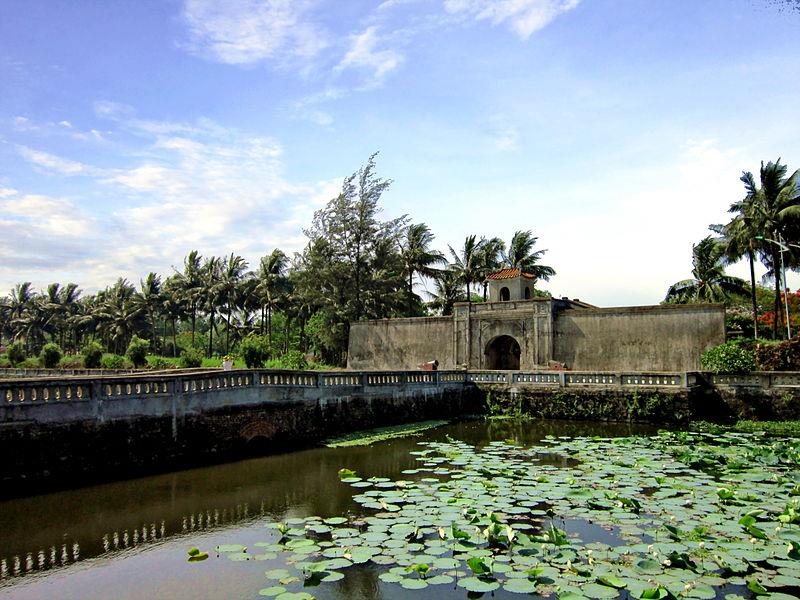
Quang Tri province lies on the intersection of the Trans-Vietnam highway and East - West economic corridor; venue, intercultural domestic regions. As fierce battlefront in the war against invasion of the Vietnamese people in the 20th century, Quang Tri store a system of monumental and unique historical sites, attracting domestic and foreign tourists as historical relics in Hien Luong riverbank, Vinh Moc Tunnels, Quang Tri citadel and so on. In addition, there are many beautiful landscapes as Tram Tra Loc, Ru Linh, Klu hot-water spring, O O waterfall, Dakrong scenic spot and stunning beaches such as Cua Tung, Cua Viet, My Thuy, Vinh Thai, Con Co island.... Beaches here bear unique beauty with the smooth white sandy beaches, blue water, cool breezes and the pristine beauty bestowed by nature.
Quang Tri citadel is located in Ward 2, Quang Tri town. It was built in the 4th year of Minh Mang King (1824). It had to cope with enormous bombing volumes of US troops in 1972 The circumference of the citadel is 2km with about 4m high, about 1 to 2 meters thick. It has 4 gates in 4 directions: east, west, south and north. Outer wall is about 18m wide moat. During the Resistance War against America in 1972 in Quang Tri Citadel, Vietnam Liberation Army had to cope with huge volumes of US - Wei bombing with a destructive power equivalent to 8 atomic bombs that the US troop dropped on Hiroshima (Japan) in 1945. The Second Battle of Quang Tri lasted 81 days until when the Army of the Republic of Vietnam defeated the North Vietnamese at the ancient citadel of Quảng Trị and recaptured most of Quảng Trị Province.
Truong Son Martyrs' Cemetery was built on Ben Tat Hill in Vinh Tuong commune, Gio Linh district, located about 38km far from Dong Ha City to the northwest. This is the largest national military cemetery collecting grave of youth volunteers, soldiers, conscripted laborer and people who built and fight to protect Ho Chi Minh Trail throughout the resistance war against America. Built on October 24th, 1975 and completed on April 10th 1977, Truong Son cemetery has the total area of 106ha including 10.327 tombs divided into 5 zones. The center is located on a 32.4-meter high hill with towering majesty white stone monument. Each zone has a memorial building with the architecture bearing the image of Vietnamese countrysides.
Khe Sanh is located in the National Route No.9, in Huong Hoa district, about 63km from Dong Ha town to the west. Khe Sanh is located in a red-soil valley with the altitude of 400m above sea level, four surfaces as rolling hills. This was one of three "magic eye" (Khe Sanh, Lang Vay and Ta Con) of McNamara electronic fence. At Khe Sanh, the battles of the campaign Route 9 - Khe Sanh in 1968 and the campaign Route 9 - Southern Laos in 1971 were took place.
Vinh Moc Tunnels is located about 13km far from the National Route 1A to the east, 6km from Cua Tung beach to the north, in Vinh Linh district. The tunnel is 2km long with 3 underground floors. This used to be a fortress of North Vietnam during 7 years against of destructive war of the US imperialism. Vinh Moc Tunnels is one of the attractions of the famous tourist route DMZ (demilitarized zone) appealing many domestic and foreign tourists, especially the American veterans. They come to admire this unique feat, a typical evidence of the sacrifices for independence and freedom of the people of Vinh Moc in particular and Vietnamese people in general.
Dakrong landscape is a common name of a region with majestic and charming natural scenery in the western mountainous region of Quang Tri. This scenic spot has the beautiful Dakrong River, graceful Dakrong Bridge and precious natural mineral water. Located in Vinh Linh district, Cua Tung attracts tourists with beautiful beaches, smooth white sand close to historic sites as Latitude 17, Hien Luong Brigde, Ben Hai River, Truong Son cemetery. Cua Tung is not merely a historic site but also a famous tourist site. Offshore, Con Co island looks like a golden turtle emerging from the water remind the legends from the ancient times.
Festival
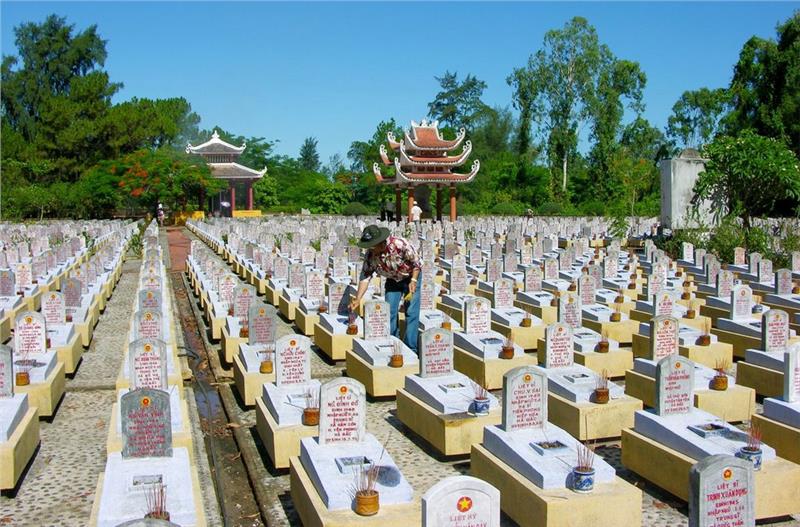
Besides the cultural heritage of revolutionary war, the typical heritage, colorful culture of Quang Tri is also dotted with the unique festivals. There are folk festivals in Quang Tri as Tet holiday, Double Five festival, tet com moi, Fishing festival, Yu Lan Festival, "Uong nuoc nho nguon" (drinking water remember its source), "Huyen thoai coi Truong Son" (Legendary Truong Son) and "Thong nhat non song" (National Unification). Legendary Truong Son festival associated with the anniversary of War Invalids and Martyrs' Day annually held on July 27th, expressing the moral philosophy of drinking water remember its and emotions of our people for the heroic martyrs died for the independence and liberation of the nation. National Unification Festival associated with the anniversary of Reunification Day annually held on April 30th. This is also a festival to honor the victory of the people, comrades throughout the country in the struggle to liberate the South, unify the country. Besides, festivals and folk games are popular cultural activities in the social life appealing numerous tourists coming to Quang Tri as chay cu, swinging, playing bai choi, boat racing, boi singing, wrestling, cock fighting...
